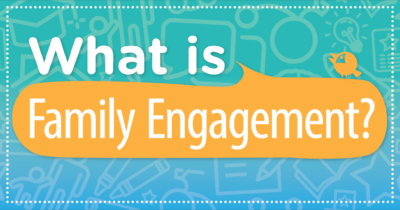- Ruffner School
- What is Family Engagement?
Family Engagement
Page Navigation
-

In the social and academic development of children, both educators and families play integral and overlapping roles. When families and schools work together to help children grow in these areas, they are more likely to be successful. Family engagement is a practice in which families* and school personnel collaborate to support and improve the learning and development of children. Sometimes, this practice is referred to as parent engagement, parent involvement, or family-school partnership.
But family engagement means more than simply informing parents about their child’s progress or challenges, where communication is primarily one-way—that is, from the teacher to the parent. Rather, family engagement happens when educators actively encourage families to participate in meaningful ways, and families support their children at home as well as at school. This establishes a mutually beneficial relationship, one in which educators are committed to listening and collaborating with families and families are committed to prioritizing their children’s education. This relationship between schools and families is:
- Centered around student development and learning
- Reciprocal, in that both schools and families benefit from it
- Developed through trust and respect
- Ongoing, in that it carries on throughout a child’s entire time in school
*Families are defined in a number of ways and may include stepparents, grandparents, adoptive parents, foster parents, aunts, uncles, siblings, and cousins. For some, the extended family may also comprise neighbors, clergy, community leaders, or anyone actively involved in caring for the child.
Image Citation
Lena Team. Framework of Family Engagement. https://www.lena.org/family-engagement/. Accessed 18 Nov. 2022
Citation:
Lena Team. Framework of Family Engagement. https://www.lena.org/family-engagement/. Accessed 18 Nov. 2022

